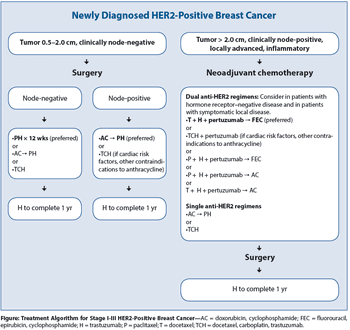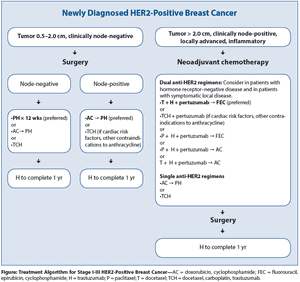
This management guide covers the diagnosis and treatment of early-stage breast cancers, including lobular carincoma in situ (LCIS), ductal carcinoma in situ (DCIS), and both noninvasive and invasive disease.

Your AI-Trained Oncology Knowledge Connection!


This management guide covers the diagnosis and treatment of early-stage breast cancers, including lobular carincoma in situ (LCIS), ductal carcinoma in situ (DCIS), and both noninvasive and invasive disease.

This management guide covers the risk factors, symptoms, screening, diagnosis, prevention, and staging of breast cancer.

This chapter addresses the diagnosis and management of locally advanced, locally recurrent, and metastatic breast cancer, that is, stages III and IV disease.

This management guide covers the treatment of stage II breast cancer, malignancies with primary tumors > 2 cm that involve ipsilateral axillary lymph nodes and tumors ≤ 5 cm without nodal involvement.

This review discusses the treatment of primary, nonmetastatic HER2-positive breast cancer in the adjuvant and neoadjuvant settings-settings in which tremendous progress has been made.

Disease-free and overall survival have improved significantly for women diagnosed with early-stage breast cancer. At the same time, systemic therapy has only slightly enhanced long-term outcomes in advanced breast cancer, a disease that remains largely incurable. Several single-agent and combination chemotherapy approaches are available to women with hormone-insensitive advanced disease that may improve overall survival and progression-free survival, minimize symptoms and complications related to the disease, and improve overall quality of life. In addition, new cytotoxic and targeted agents have been recently introduced into practice and have improved both survival outcomes and quality of life. In this review, we will provide an update on commonly used chemotherapy-based regimens for the treatment of metastatic breast cancer, with a focus on tailoring therapy to different subtypes of the disease.

Eliminating cancer disparities-not only for racial/minority groups but for all underserved populations-must be a priority for those involved in cancer care. For individual practitioners, the first step in addressing disparities is accomplished through understanding the possibility that disparities exist in varying depth and complexity for each racial or ethnic minority patient.

Over the past 20 years we have witnessed the emergence of a new generation of aromatase inhibitors as valuable antiestrogens in the management of both advanced and early-stage breast cancer. In addition, the list of cytotoxic chemotherapeutic agents useful in the control of breast cancer has grown considerably. The emergence of anthracyclines was a major chemotherapeutic step forward in the 1980s, and the taxanes have clearly been the agents with the greatest impact on breast cancer treatment over the past decade. The end of the past 2 decades has been characterized by a greater understanding of the molecular biology of breast cancer, rational drug design, and the development of agents that disrupt specific cellular targets and pathways. The development of better prognostic and predictive assays that employ a panel of genes involved in the malignant and metastatic phenotype promises to allow clinicians to better select patients who could forgo adjuvant chemotherapy. Finally, adjunctive and supportive therapy of breast cancer has evolved substantially over the past 20 years. This review will highlight some of the landmark accomplishments during this time, and offer a glimpse at where we might be 20 years from now.

Fluorouracil (5-FU) has remained the standard therapy for the treatment of advanced colorectal cancer for over 40 years. Unfortunately, only a minority of patients experience objective clinical response.

Discussed herein are selected oral fluorinated pyrimidines that are converted to 5-fluorouracil (5-FU) in vivo to exert antitumor activity. These agents include capecitabine (Xeloda), tegafur-uracil (UFT) plus leucovorin (Orzel), and S-1 (BMS247616). These agents offer the convenience of an orally administered therapy with potentially fewer toxic effects than conventional bolus regimens of 5-FU plus leucovorin. These oral agents provide prolonged 5-FU exposure at lower peak concentrations than observed with bolus intravenous administration of 5-FU and may confer pharmacoeconomic advantages by reducing administration costs and toxicity-related hospitalizations. These regimens also have the potential for improved therapeutic activity by achieving higher 5-FU concentrations in the tumor or by biochemically modulating 5-FU. Phase III trials in patients with advanced colorectal carcinomas are comparing the antitumor activity of these agents with that of intravenous 5-FU plus leucovorin. [ONCOLOGY 12(Suppl 7):48-51, 1998]

Published: October 1st 2007 | Updated:

Published: August 1st 2006 | Updated:

Published: December 3rd 2000 | Updated:

Published: October 1st 1998 | Updated:

Published: April 15th 2014 | Updated:

Published: September 1st 2006 | Updated: